|
|
Personal Projects
|
|
|
Originally my plan was to go into this blog post discussing “Survival Games,” an analysis of commonalities and traits that make up good survival games. For this I had started playing quite a bit of "The Long Dark," a game that's still in alpha but strands it's user in a cold alpine wilderness. Meanwhile, to everyone's surprise, No Man's Sky dropped a massive update. In the "Foundation Update" No Man's Sky released a ton of new features, including base building, updated UI, the ability to own freighters, and more. Considering my previous post titled "Player Defined Goals," where I reviewed the first release of No Man's Sky, I think it only makes sense for me to return to it and explore it in today's post about Survival Games. While I'll be discussing these games at length, there's really no plot implications here and so you shouldn't be too worried about spoilers. When it comes to talking about "Survival Games" it's really hard to not talk about "Survival Horror," yet for this post I really wanted to evaluate games that focus purely on survival. Survival games tend to have 3 main characteristics; resource management, exploration , and crafting... with some slight variations to each. I'll be using these characteristics to help frame this analysis, in regards to different games and how they use these elements. The Long Dark is a really structurally interesting game. While it's in Alpha, you can see how these mechanics are beginning to work really nicely with one another. What I played of The Long Dark, is that you're dropped into a random location and time of day. Your first thoughts are, as they should be, to look for shelter. The game forces the player to learn quick that they cannot stay outside for very long, without building a fire to keep warm. In my first moments of the game I stumbled upon a large branch, that I could break down for resources. I went ahead and did so but was shocked to find that doing actions like these have a cost. It costs time, calories (which is how they manage hunger in the game), exhaustion, and depending on just how cold it is... you become chilled quite fast. As you can imagine my first playthrough didn't have me lasting much longer than a day. While the learning curve feels steep, I found myself to be invested fairly early on. After dying in several different ways, The Long Dark taught me caution in all my decisions. Mechanically speaking there are many resources to manage in The Long Dark, yet the way this information is illustrated for the user allows for easy on boarding. Unless something terrible happens, the player is slowly introduced to different aspects of your character. While there are many things to manage, I never felt overwhelmed… although I was often overburdened by trying to have my character carry as much as possible. My initial experience felt very much like my playthrough of Far Cry Primal, which I discussed in an earlier post where I turned off the HUD while playing. I felt the same way due to the lack of information, while I was slowly introduced to more info, intially I felt like a newborn in a world that I didn’t comprehend. I appreciated the fact that I couldn’t hunt in the game right off the bat. On my fourth playthrough, on the 10th day, I finally found a rifle with four bullets. It was an incredible brief change of pace, and showed off the game’s breadth drastically.
The Long Dark does very well is to have a lot of depth to every aspect. I guess my biggest take away is that while every game has costs associated with actions, never did they feel as relevant as they did in The Long Dark. The best example for me was when I was finally able to track down a bear, shoot, and kill it. It took so much time to skin, and harvest the bear, that I had to first build a fire to stay warm while doing so. Even then I quickly became over encumbered and had to return to my shelter to unload and rest… yet when I returned to finish harvesting the bear, he had gone completely frozen and I didn’t have the tools required to finish. It was so disappointing knowing how many more resources literally lay in front of me, and yet the elements had beaten me again. It was a truly interesting learning experience. I’m still surprised to be returning to No Man’s Sky, but I found myself playing a considerable amount of the Foundation Update. If you haven’t read, I would recommend checking out my first impressions of the game here . It feels very interesting to see some of my initial critiques of the game being addressed in this update. I had mentioned earlier that No Man’s Sky struggled with satisfying both the productivity and creativity itch that Minecraft is able to accomplish. Yet in this update has certainly addressed this, with the implementation of customizable homesteads, npc quests for your home, new tech and resources… there’s suddenly a lot more to discover. In all fairness I’m still only part way into this update and have yet to even touch the elements of the game related to owning a Freighter. Which is exciting considering I’ve already sunk a ton of additional hours into this update. The Foundation Update has really breathed new life into what was a pretty dead game, there’s clear enhancements and changes to worlds, I’ve seen more unique fauna, and with the introduction of new resources and technology there’s a lot of stuff to learn. The game has definitely been rebalanced as well, where I find certain resources to be much harder to find than they previously used to be. Also while many of the NPC quests are glorified fetch quests, I’m very happy to do it and overall I find myself excited to progress. From a Survival Game standpoint, No Man’s Sky is pretty interesting. There’s really a lot of breadth, a huge number of different biomes and resources that all accumulate to a many unique scenarios. While I have to be conscientious of my survivability in No Man’s Sky, the game feels less personal than The Long Dark. While exploring is an aspect of The Long Dark, I feel more concerned about my well being… it feels so much more about me. While No Man’s Sky, I feel as though my primary concerns are related to my spaceship, exploring the stars, and inventory management. That’s not to say that it isn’t incredibly engaging, it just feels as though the driving factors feel very different between these games. I feel as though I’d be remiss if I didn’t mention Don’t Starve in an evaluation of Survival Games. This game has definitely become a staple of my previous year, as you may have noticed me mention it in a few different posts now. Don’t Starve is certainly a dynamic jaunt into the genre, most known for it’s illustrative visuals. While Don’t Starve maintains a lot of similar Survival Game tropes, survival based resource management and exploration, I believe Don’t Starve stands on it’s own for it’s unique visuals and content. So much of the game is driven by exploration and discovering unknown elements. Having something like magic certainly has it stand out against it’s competitors, and I can honestly say that even after the countless hours I’ve sunk into this game… I’m positive there are things that I still don’t comprehend. Another element worth noting is that while other games have had “Sanity” as a resource, most of those games have been more horror based genres, rather than a purely survival game. As a Darksouls fan I can confidently say that Don’t Starve stands well on it’s own as being one of the most unforgiving games out there. That being said the playfulness of the game’s visuals and variety of environments strongly encourage players to explore the worlds that Klei Entertainment has created. Thinking about the driving factors of both No Man’s Sky and The Long Dark… I somehow feel like Don’t Starve falls somewhere in the middle. While I’m very conscientious of my character and their well being, it’s more in an effort to get more game time to explore the world further. I REALLY wanted to do an evaluation on We Happy Few, unfortunately it ran very poorly on my laptop and I got limited game time. That being said I really felt as though it was worth mentioning in this post, for it’s unique stance on the survival genre. (I’ll try to be as factual as possible, but I apologize if I get some elements wrong.) While We Happy Few is still in it’s Alpha, much like The Long Dark, we can see a lot of the mechanics at work already. What stuck out for me was it’s use of both the traditional survival elements, as well as a social component. We Happy Few takes place in an alternative 1960’s London, where there’s this pill that instill “joy” in it’s citizens. It becomes a large part of both social norms and the law. In the few moments of gameplay that I experienced, I was thrown into a more desperate part of town. I noticed my character was wearing “tattered” clothes, and my first instinct was to actually repair this. Yet it had a negative effect on how people viewed me in town. As this was a poor neighborhood, people began to mock me and be more suspicious of me. I thought this was a truly interesting element to add to this genre. So often do we think of survival games in the same context as The Long Dark and being alone in the wilderness… when it can be a very different struggle in a city. We Happy Few maintains many of the same elements as other survival genres, yet puts an interesting spin on these by injecting a both a social and puzzle dynamic into the game. 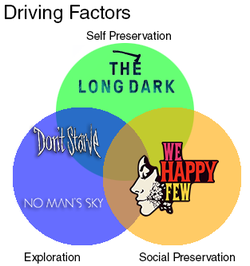 Survival games mainly use the same key elements of resource management, exploration, and crafting… yet the driving factors of these games can feel massively different. Overall I believe it’s how these elements are balanced, the setting, and the visual direction of the game that determines what ends up being a player’s driving influence. In the examples I’ve provided, I don’t necessarily believe that one game is more successful than the other… merely it’s interesting to see such dynamically different takes on the same key elements.
0 Comments
Leave a Reply. |
AuthorI make games, I play games... and sometimes I have some thoughts about that. Archives
March 2024
|
Proudly powered by Weebly


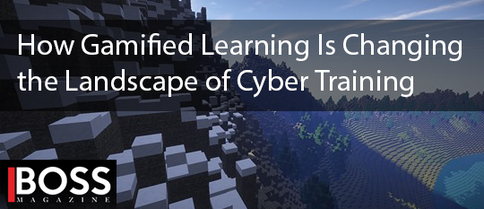









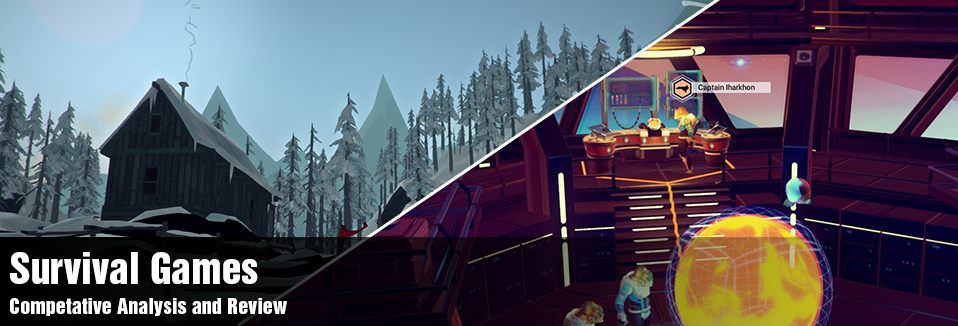
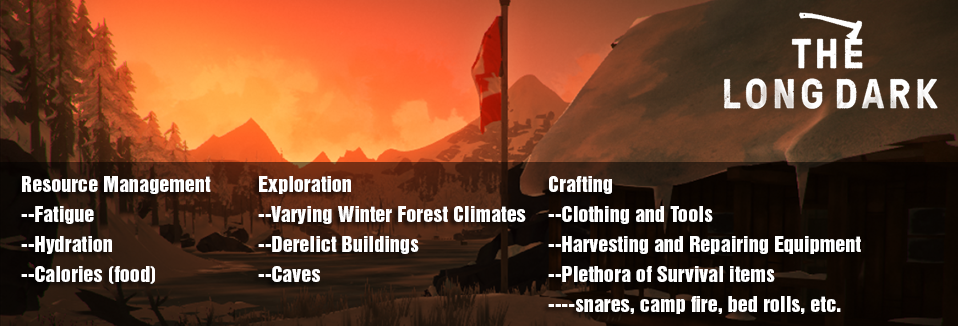
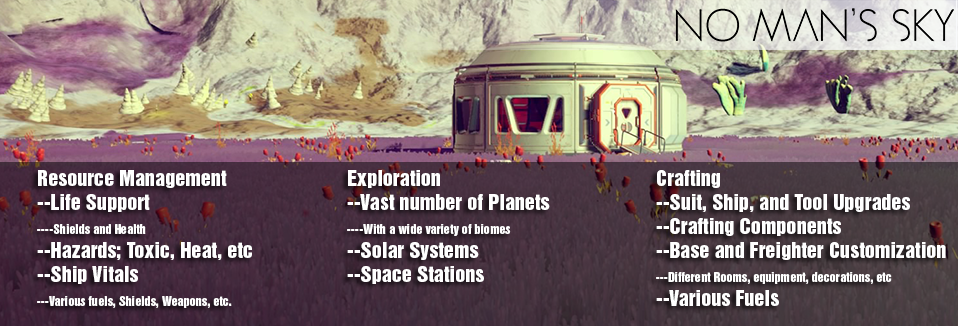
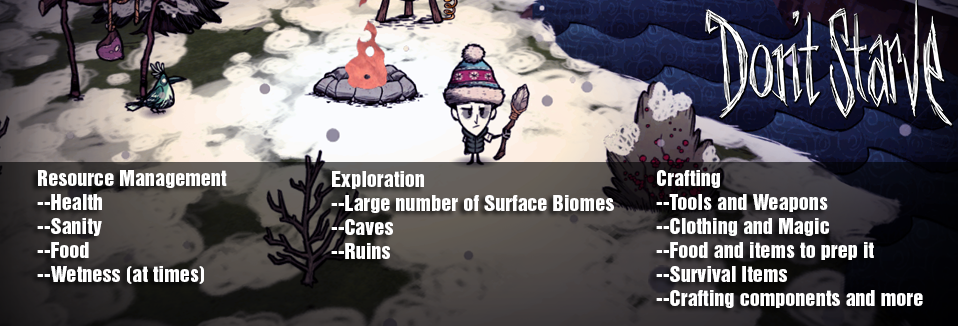
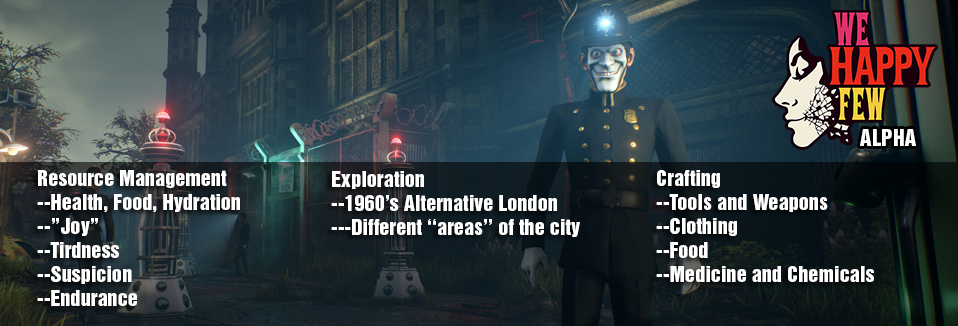

 RSS Feed
RSS Feed